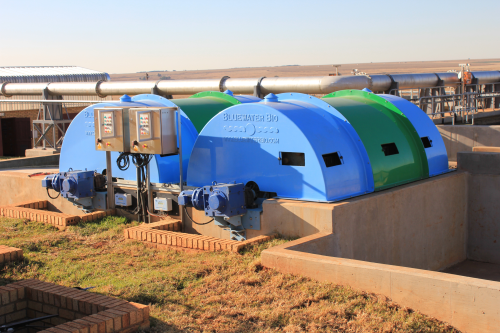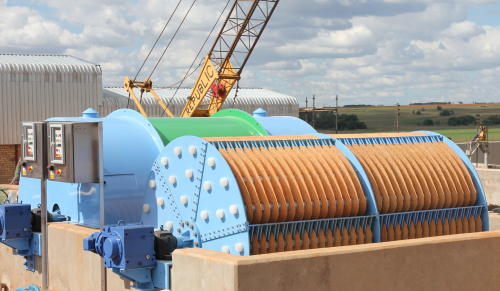

Wastewater treatment company Bluewater Bio International has completed installation of its HYBACS (Hybrid Activated Sludge) process at the Botleng wastewater treatment plant in South Africa, and the plant, serving 17,000residents, is now operational and producing a high quality effluent. The project is expected to cost in the region of 55 million Rand (around US$8 million) when a future second phase extension planned by the municipality bringsthe treatment capacity to a total of 7,000m3. The company is expecting a third larger order imminently.The project, secured via Bluewater Bio’s licensing agreement with Headstream Water Holdings, was for the extension to the Botleng Sewage Treatment Plant, which was overloaded and in need of additional capacity. The extension, situated alongside the existing Botleng plant, is provided by a new 3,500m3 per day treatment plant in which Bluewater Bio’s patented HYBACS™ process has been deployed in an installation which includes two of its SMART™ (Shaft Mounted Advanced Reactor Technology) units, which are fundamental to the process. The nutrient removal plant treats municipal wastewater with Chemical Oxygen Demand (COD), ammonia and Total Phosphorus (TP) concentrations of around 600mg/l, 45 mg/l and 6 mg/l respectively.As the new HYBACS plant at Botleng nears the end of its biological commissioning phase, sampling indicates the treated effluent is a very high quality and is exceeding the stringent discharge standards required; although the plant is not yet treating the full design load, COD is less than 30mg/l, ammonia concentration is less than 1 mg/l and nitrate concentration less than 4mg/l. TP removal currently exceeds 90%.The Botleng Wastewater Treatment Plant services the town of Delmas in the Mpumulanga Province. Delmas lies 60 km east of Johannesburg and has a population of approximately 92,000. Botleng is one of two wastewater treatment plants (WTPs) in the town, the other being the Delmas town WTP. These sewage treatment facilities have to produce effluents that comply with the specifications of the relevant authorities, which include nutrient removal. The HYBACS process is ideally suited to a modular scale up and the new Botleng HYBACS plant has been designed to enable a cost effective second phase extension to 7,000m3 per day, should the additional capacity be required as a result of the rapid expansion of the town. The plant is owned and operated by the Victor Khanye Local Municipality, which has given the capacity expansion at both this and the Delmas town WTP top priority given the continued growth of the town and the municipality’s commitment to providing sanitation services to the community.The HYBACS process, with its high-quality, modular treatment capability and lower energy consumption, was an ideal solution for the upgrade and expansion of these WTPs to provide the additional capacity needed, and to ensure the plants comply with the required effluent specifications.Moedi Consulting Engineers, the appointed consulting engineers to the municipality, recognised the advantages of the HYBACS process and specified the process for the upgrade of the Botleng WTP. Marx Jordaan, principal consulting engineer of Moedi Consulting Engineers, said: “We are very impressed with the treatment performance shown so far by the new HYBACS process deployment at the Botleng plant. As the town of Delmas continues to grow we believe that the HYBACS process presents an ideal potential solution for further cost effective extensions to provide the required additional treatment capacity.”Daniel Ishag, chief executive officer of Bluewater Bio, said: “We are delighted to have implemented the first deployment of our HYBACS technology in South Africa through our exclusive licensing agreement with Headstream Water Holdings. We have, in the meantime, secured a second order in the country for a plant which is currently in construction at Swartruggens, a town about 170 km North West of Johannesburg. We are working closely with Headstream to secure our third order, also near Johannesburg, along with additional sales prospects in both South Africa and its neighbouring countries.”Martie Janse van Rensburg, non-executive chairperson of Headstream Water Holdings, commented: “This first deployment of Bluewater Bio’s HYBACS technology in South Africa will be shortly followed by the installation at Swartruggens. We are also confident of securing our third and largest project in the third quarter of this year.Headstream Water is seeing a considerable amount of wider market interest and unsolicited enquiries as a result and we anticipate accelerating adoption of Bluewater Bio’s HYBACS technology in the country and surrounding regions.” Ms. Rensburg also serves as non-executive chairperson for Johannesburg Water, the municipal water utility responsible for delivering water and sanitation services to the four million people living in the City of Johannesburg.
HYBACS
Bluewater Bio says that the HYBACS product offering addresses wastewater treatment requirements associated with a number of applications. These include:• municipal and domestic wastewater from cities and residential developments;• upgrading existing wastewater treatment plants to meet stricter regulations and legislation;• wastewater reuse, providing high quality treated effluent for use in agriculture, irrigation, landscaping, and 'greening' initiatives where there is water scarcity, such as the Middle East;• beverage wastewater from brewers and drink manufacturers;• food processing wastewater, for example effluent from an abattoir or confectionary plant; and• leacheate wastewater, which is the fluid which accumulates in landfill sites.HYBACS is also able to treat efficiently a much wider range of organic industrial wastewaters, including highly concentrated livestock wastewater and the effluent from, among others, textile manufacturers, hospitals and factories.The HYBACS process is a nutrient removal hybrid activated sludge system, which has been developed from a process originating in South Korea. The process consists of two biological stages followed by clarification. The first stage is Bluewater Bio’s Shaft Mounted Advanced Reactor Technology (SMARTTM) units, with attached biomass. The second stage is an activated sludge process, which suspends biomass. The company adds that the HYBACS system can produce effluents with qualities compliant with the most stringent European nutrient removal standards, albeit supplementary dosing may be needed to obtain compliance with the tightest TP standards.
Bahrain
Bluewater Bio has also recently secured a contract with the Ministry of Works of the Kingdom of Bahrain for the upgrading of the Tubli wastewater treatment plant for Tubli Bay nature reserve using HYBACS.The US$20 million contract is to upgrade and expand the Tubli wastewater treatment plant, which is the largest of its kind in the country and serves a population equivalent to around 800,000. The HYBACS biological treatment process, deployed in 42 of its proprietary SMART™ reactor units, will be installed to treat an average wastewater flow of 100,000 m3/day (equivalent to a population of 303,000), significantly improving the quality of the effluent of the plant as a whole. With the ongoing improvements to the sludge treatment facilities, the scheme will also prevent the excessive carry-over of sludge from the treatment plant into Tubli Bay.The existing secondary wastewater treatment plant at Tubli was originally designed for a capacity of 200,000 m3/day, however, as a result of the rapid urban development and economic boom in the Kingdom of Bahrain, the plant has become excessively overloaded, causing obvious deterioration in the quality of the treated effluent and in the ecology of Tubli Bay. Following the HYBACS upgrade, which avoids the construction of large biological reactors and clarifiers, the treatment capacity of the overall secondary treatment plant will be 300,000 m3/day.



